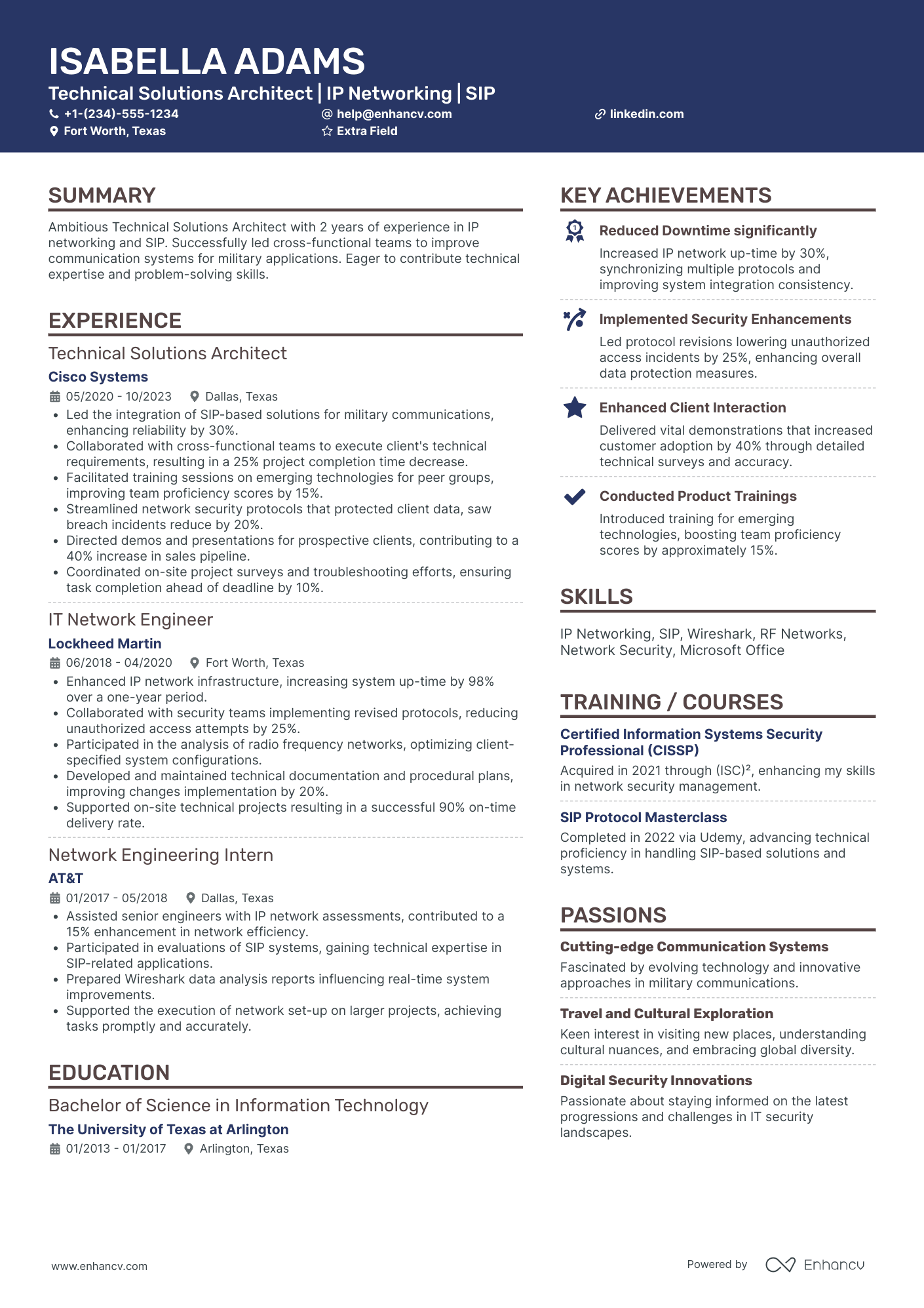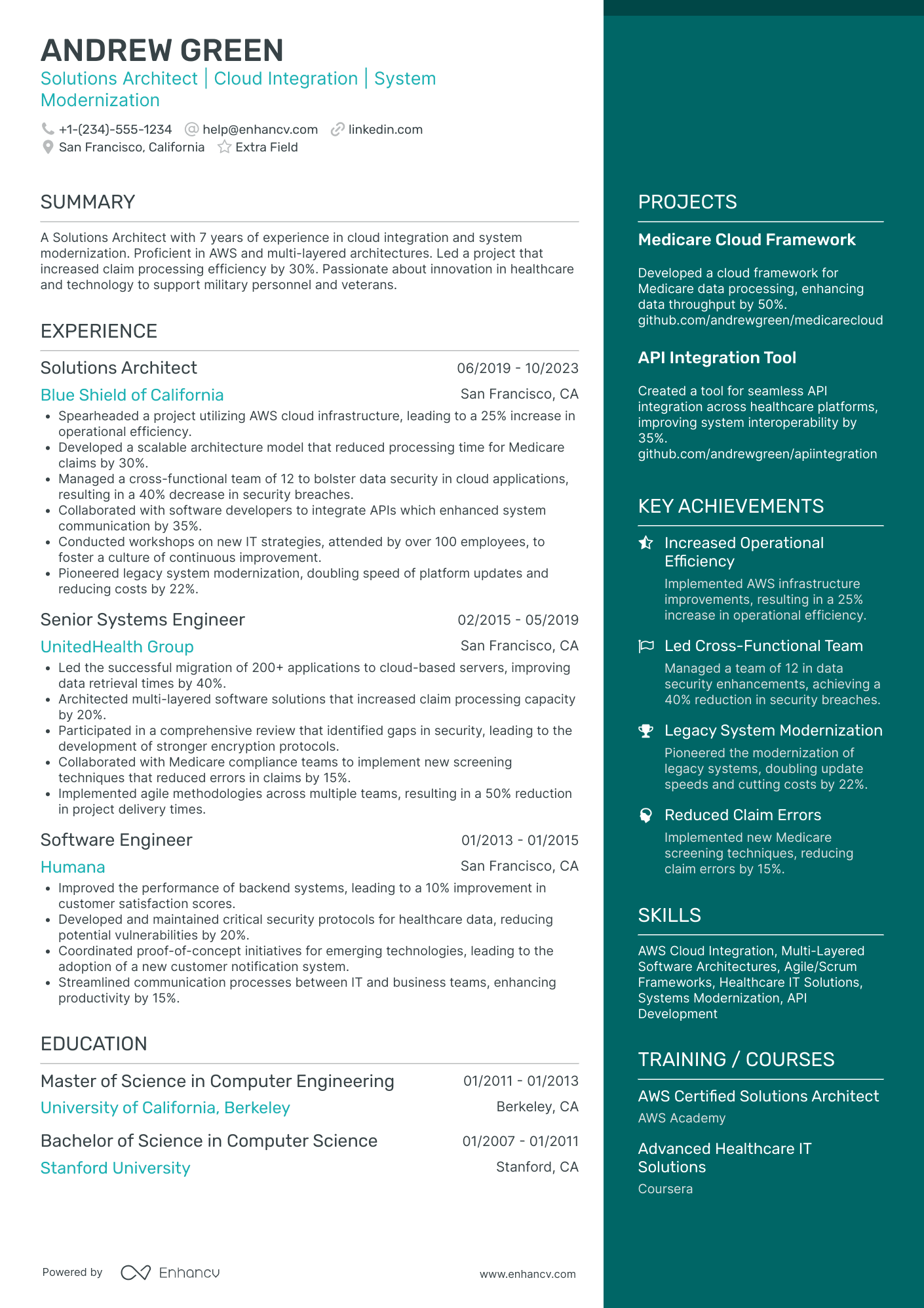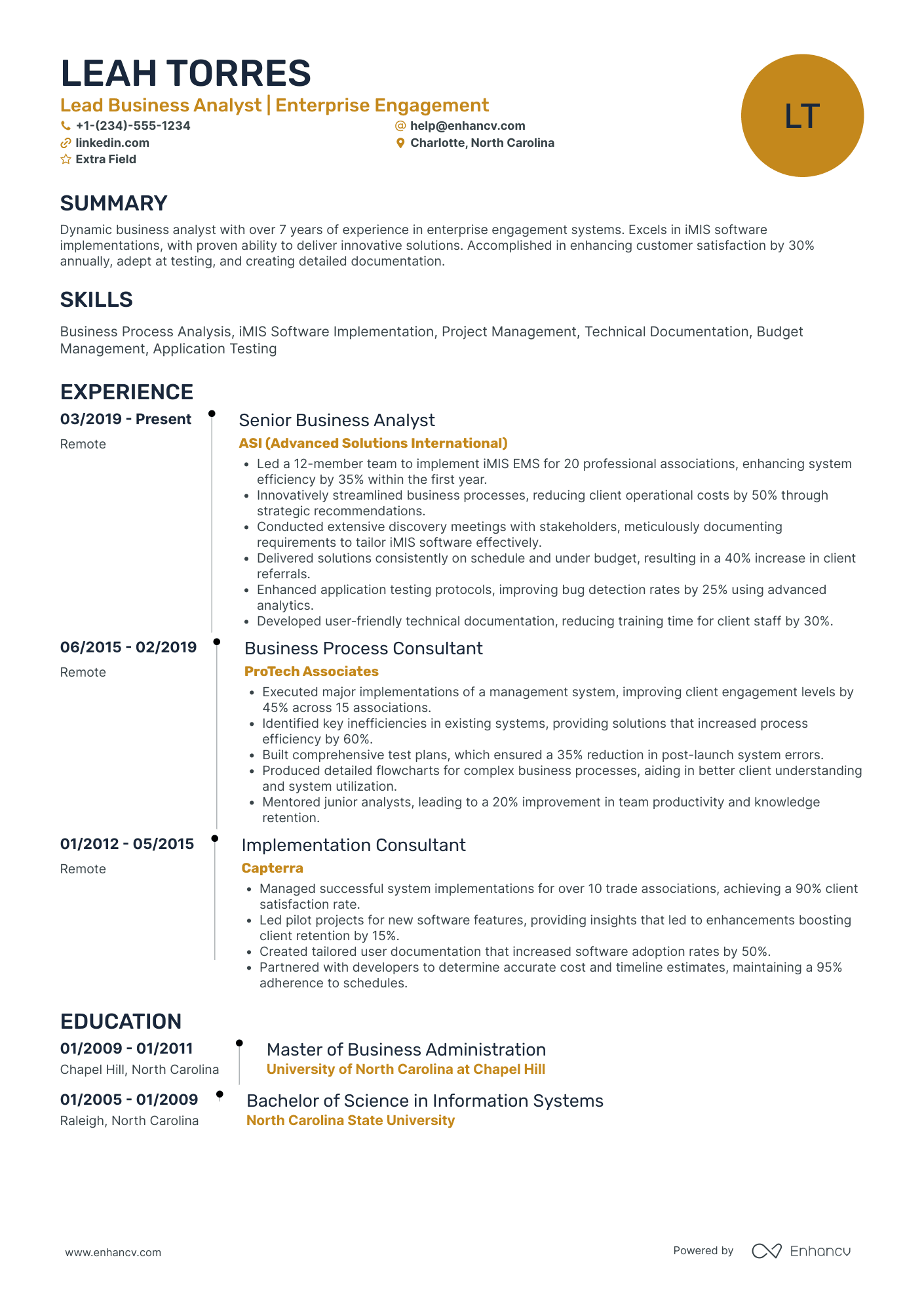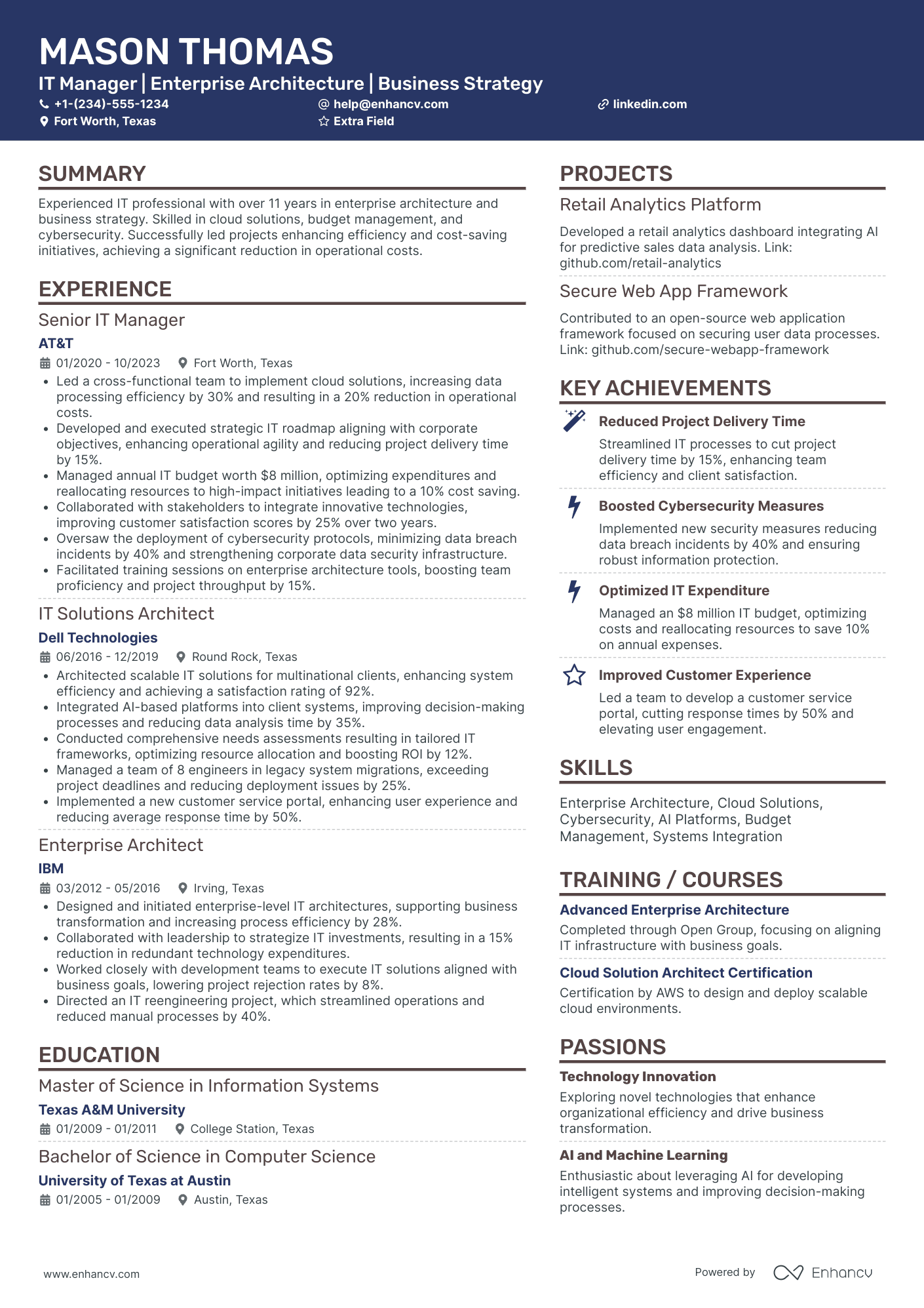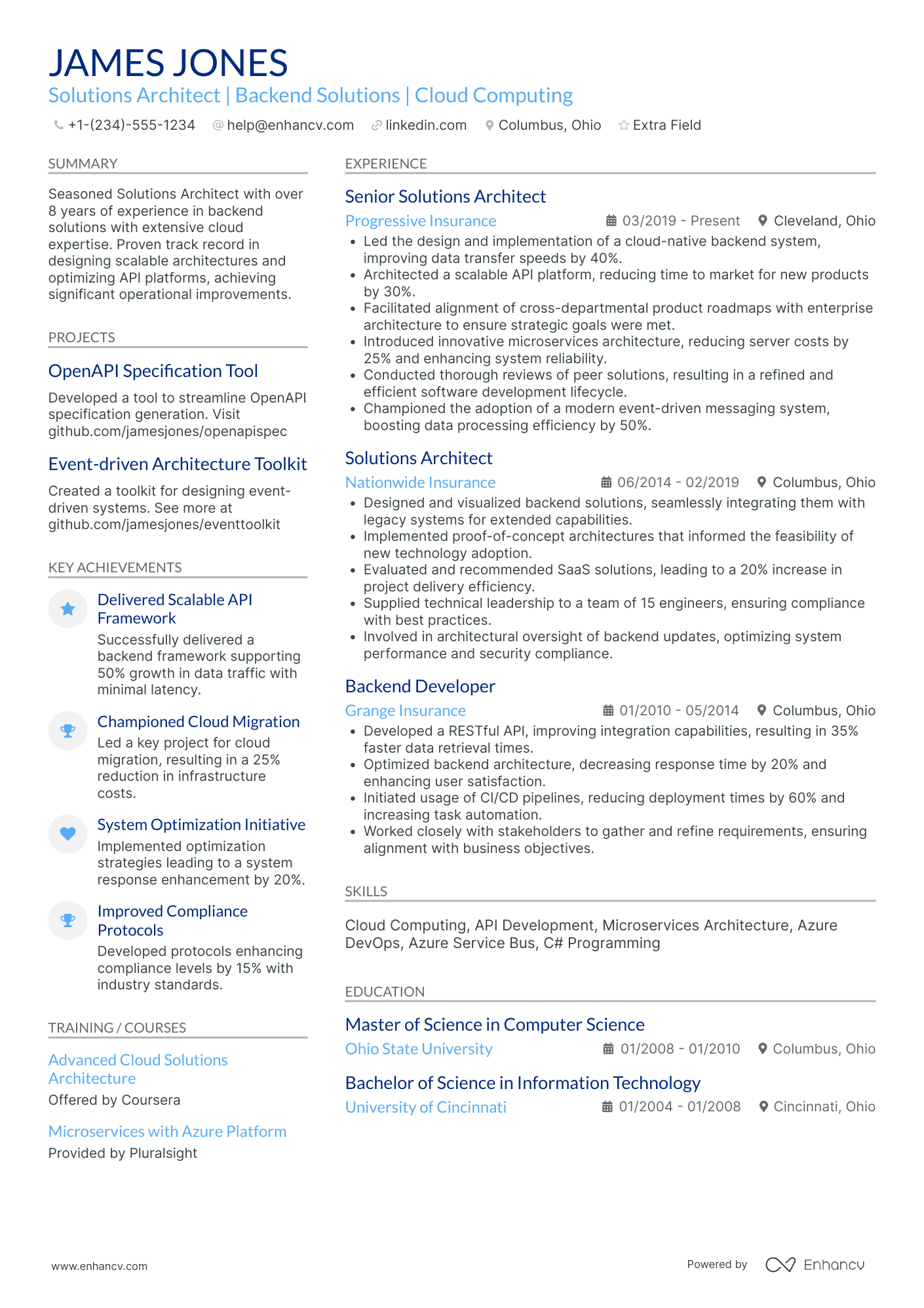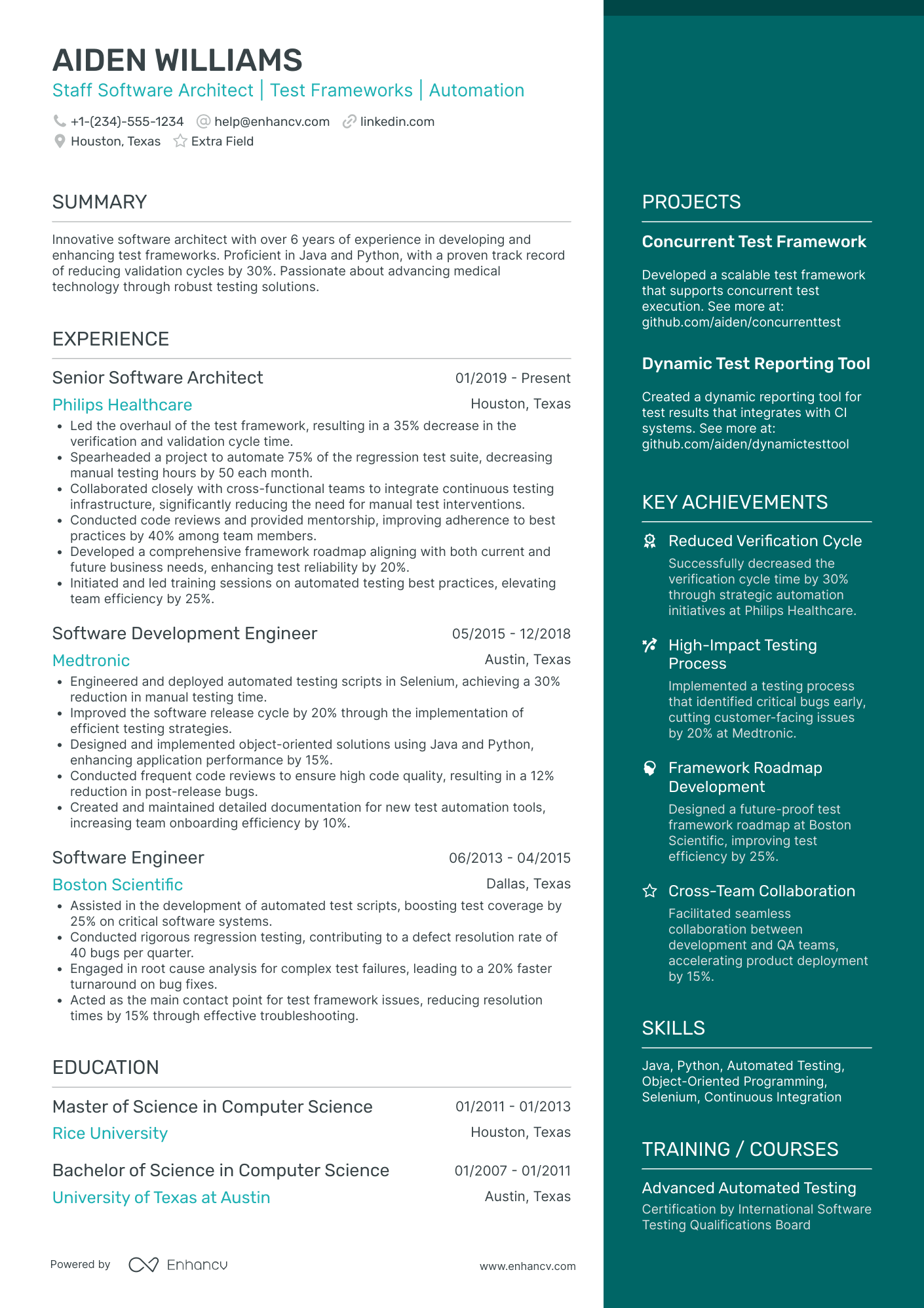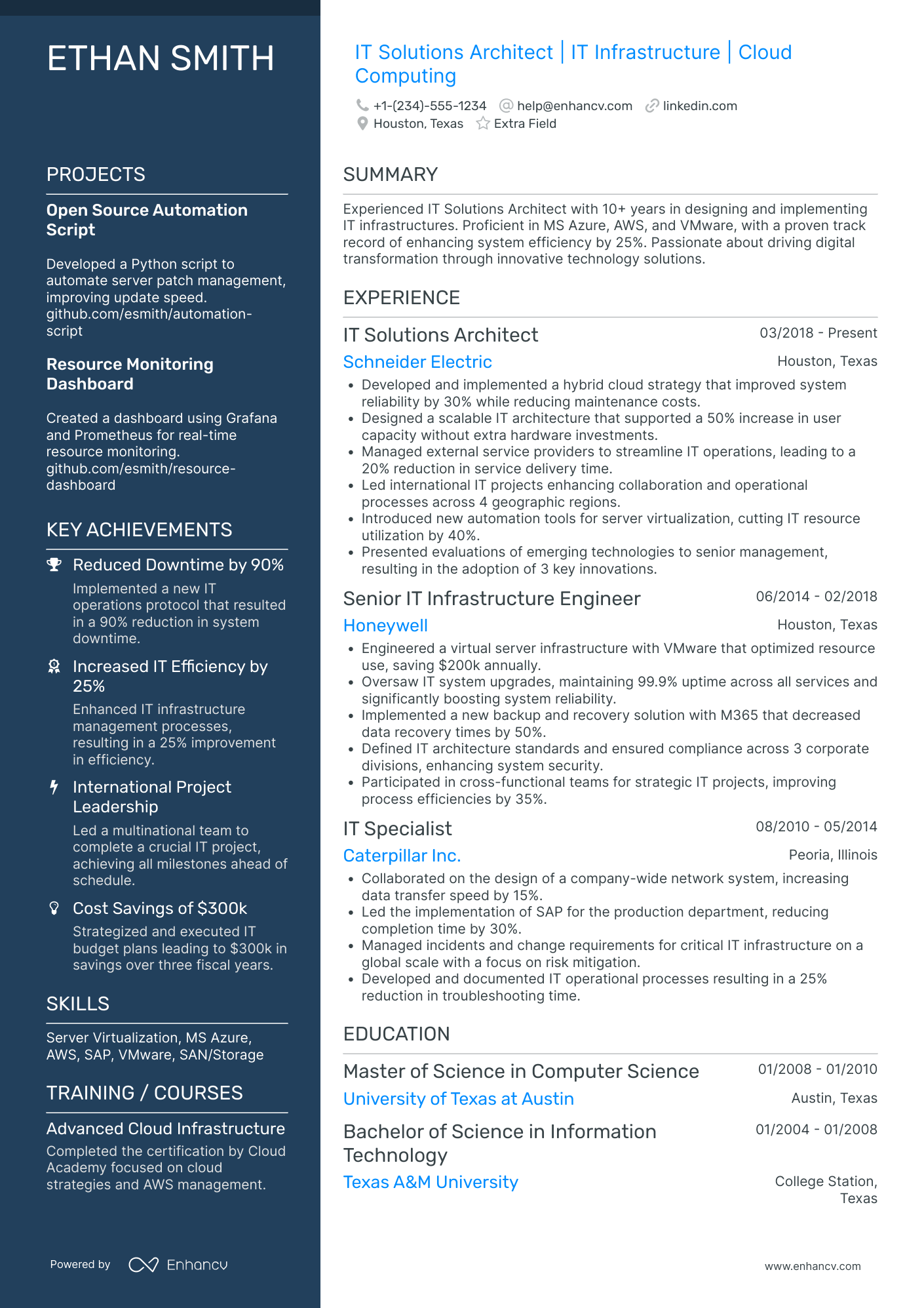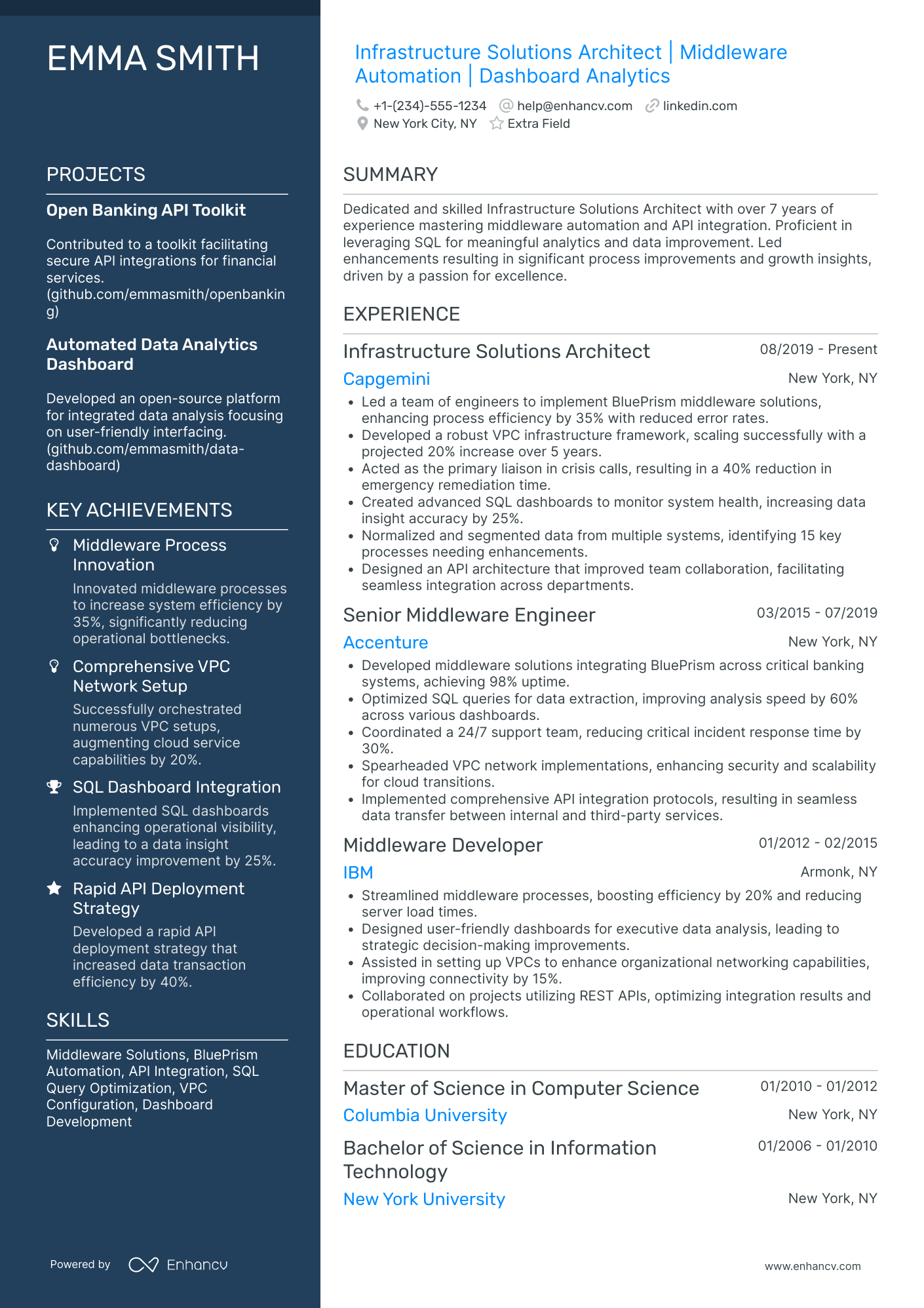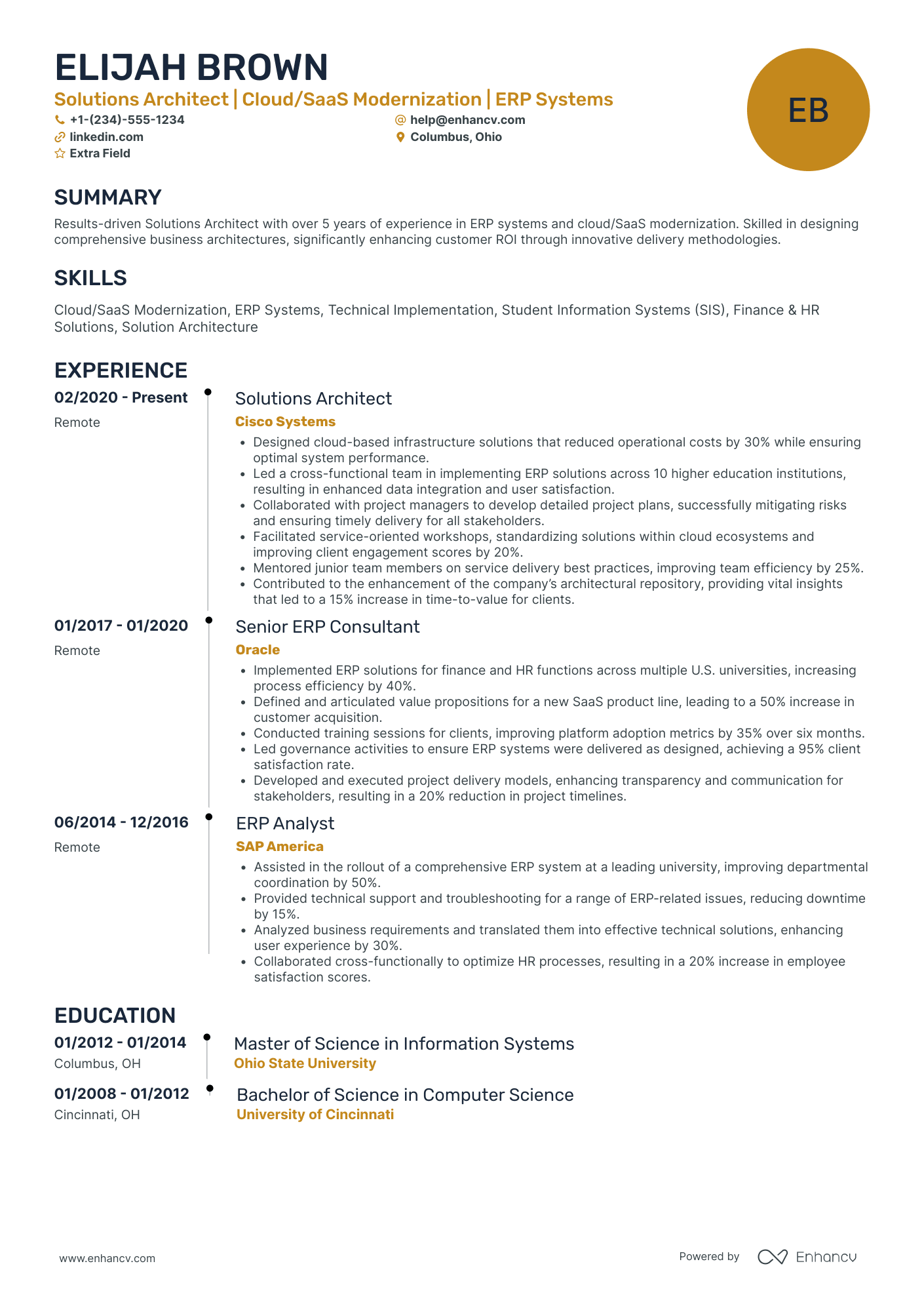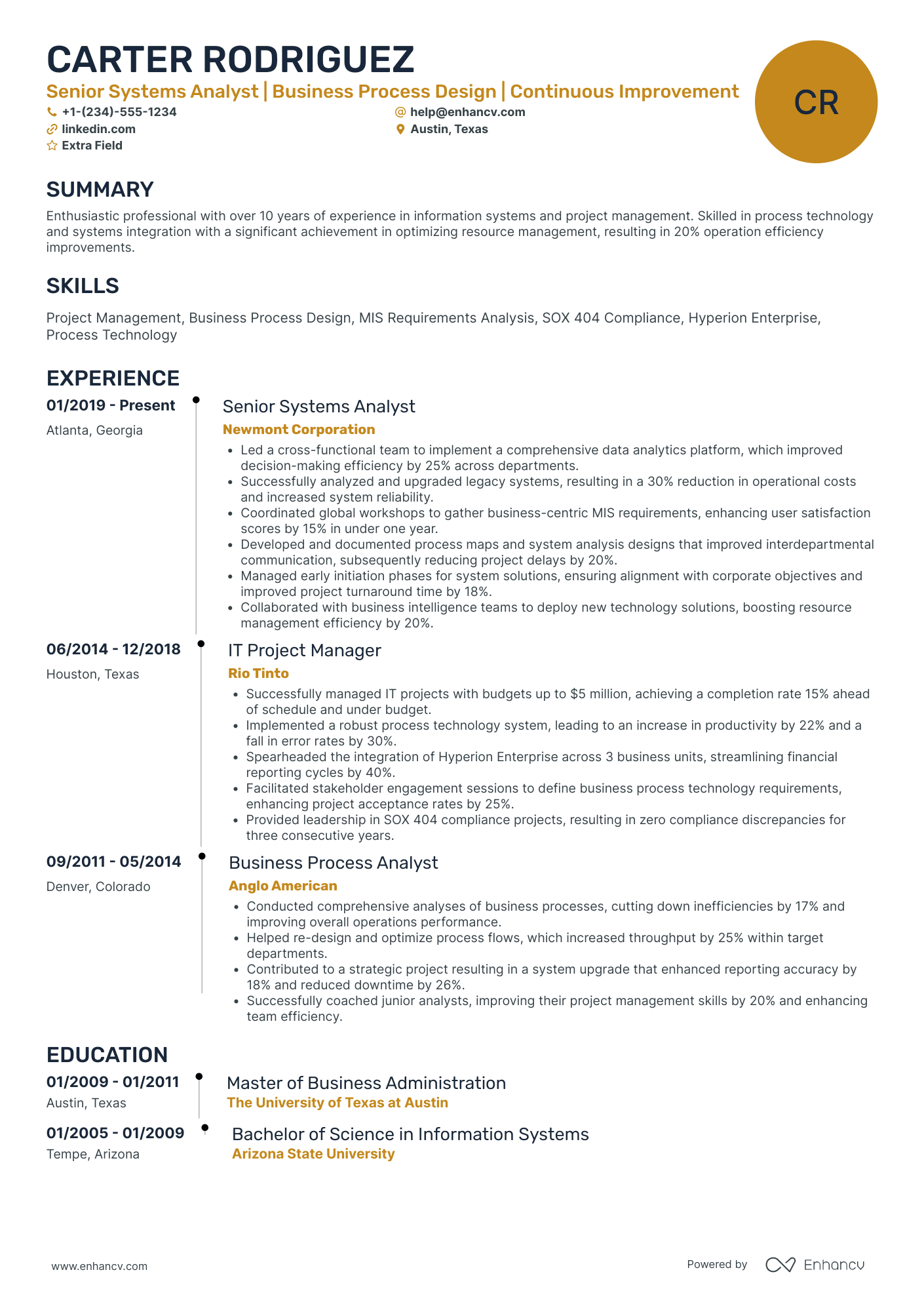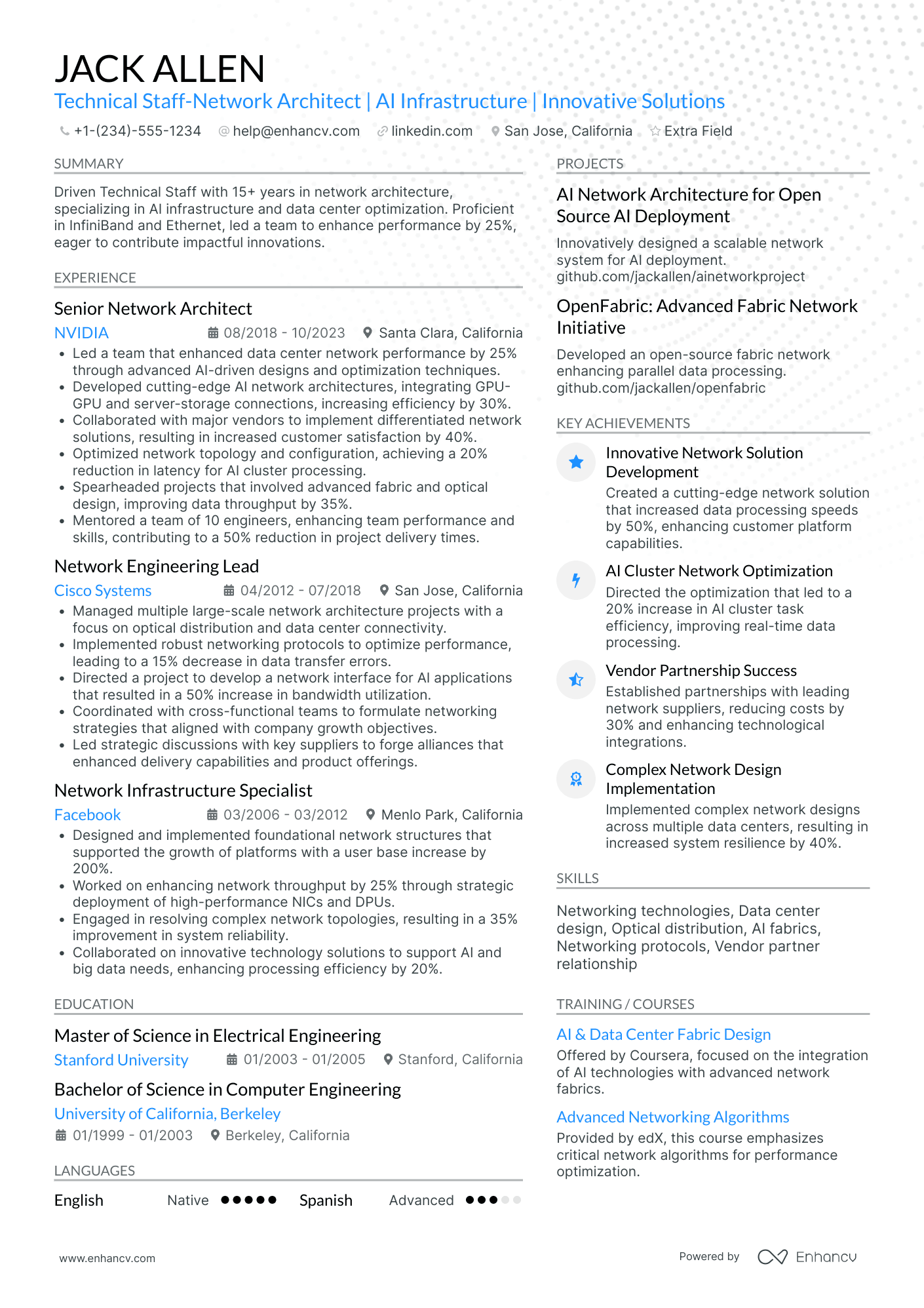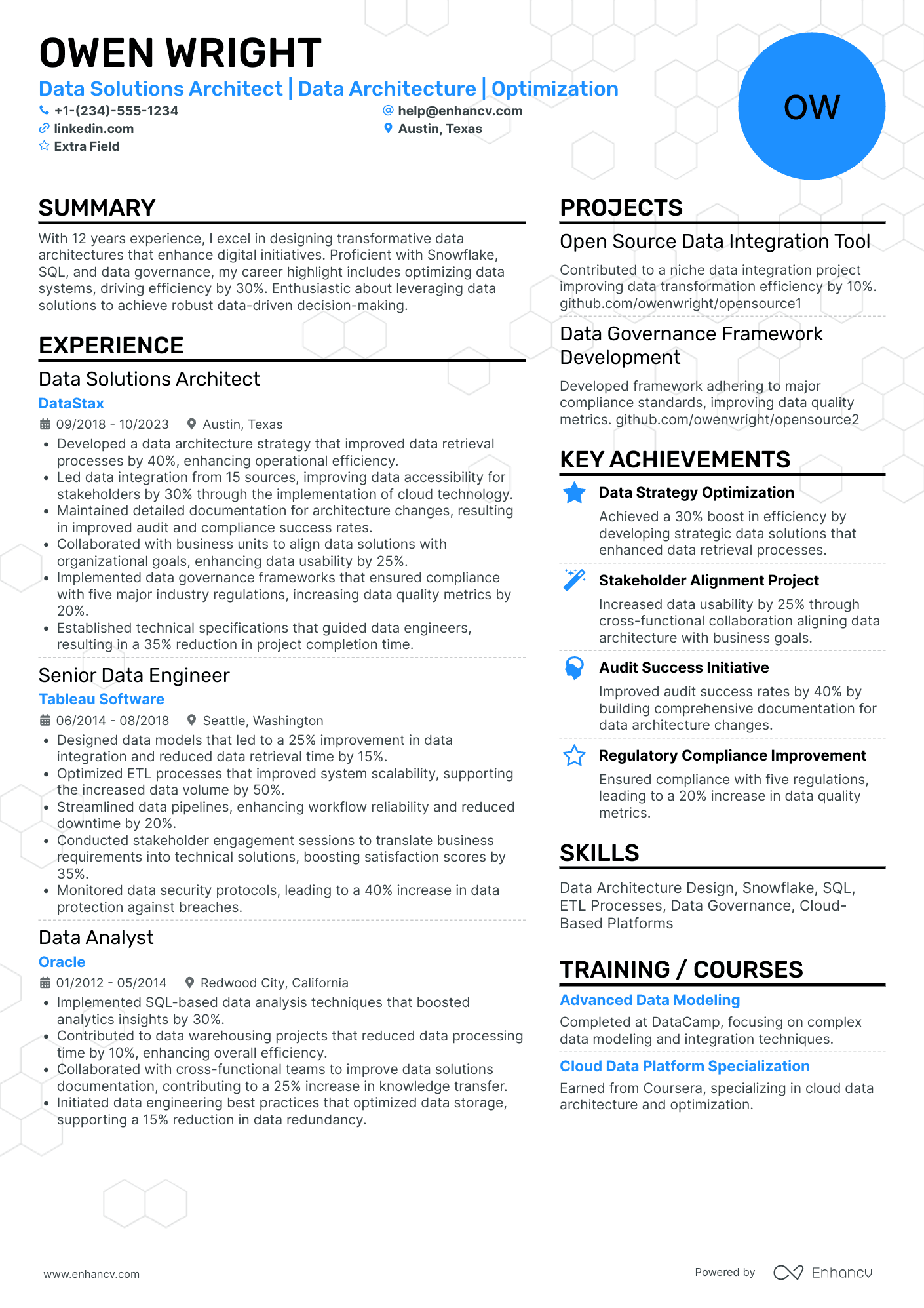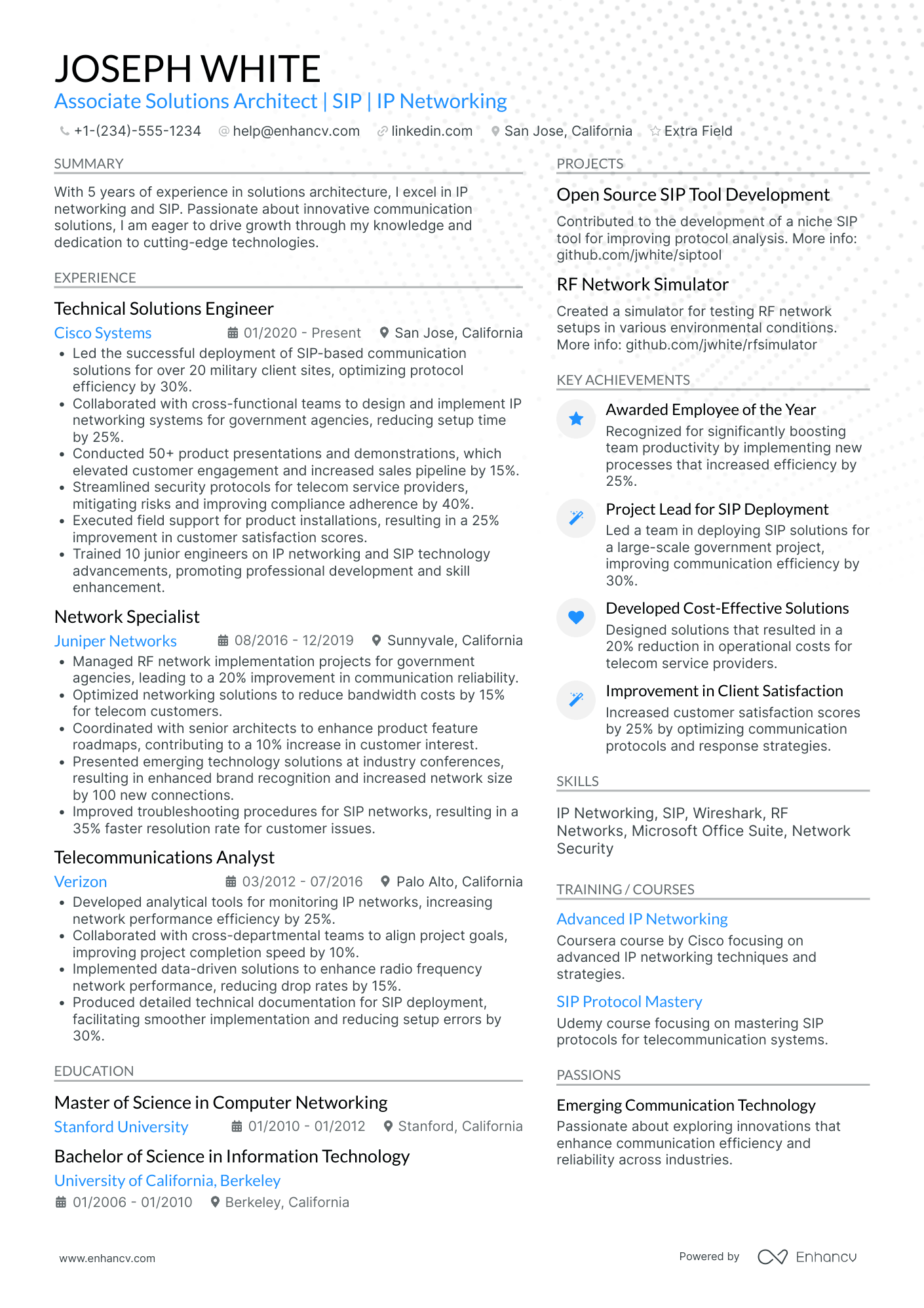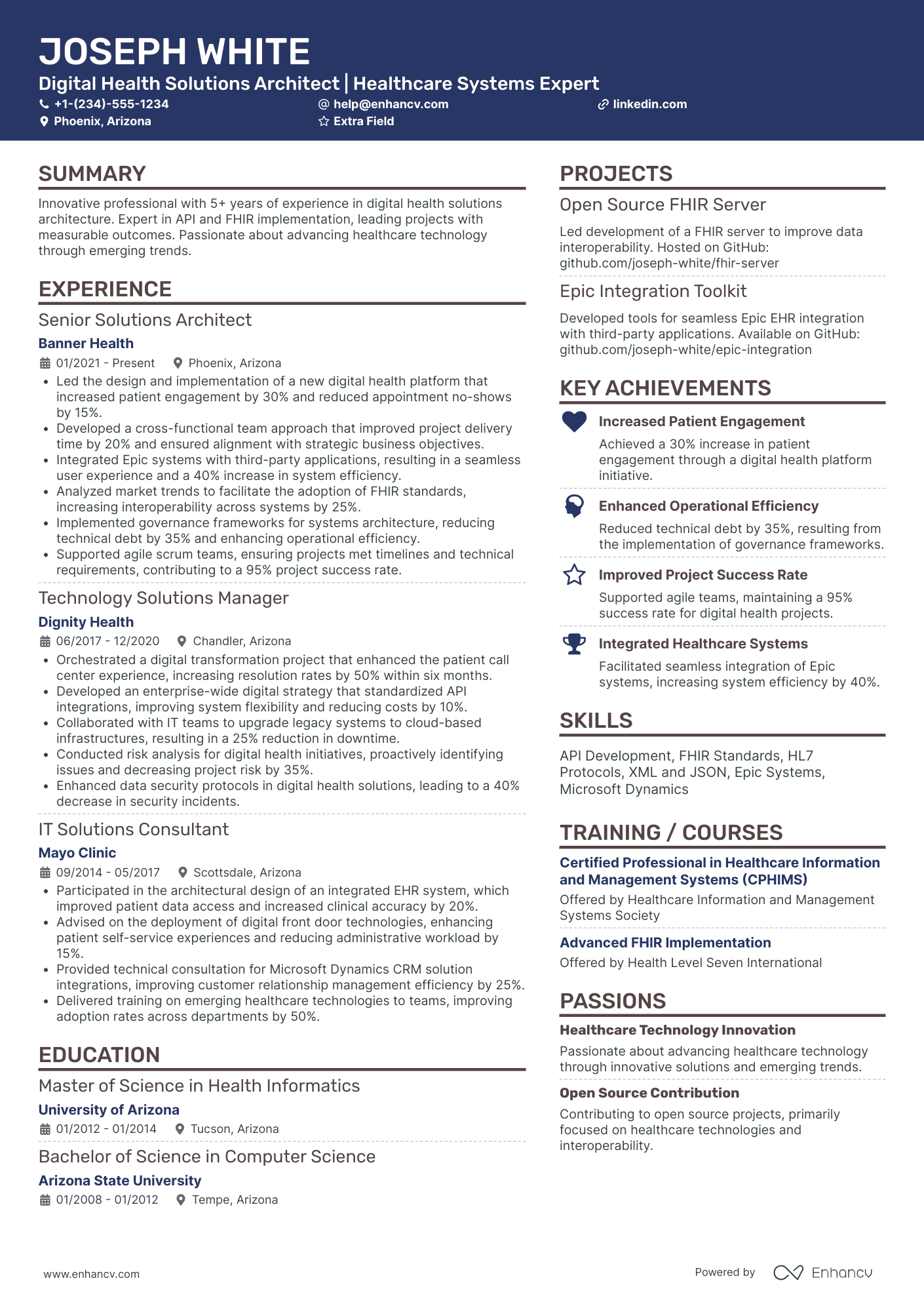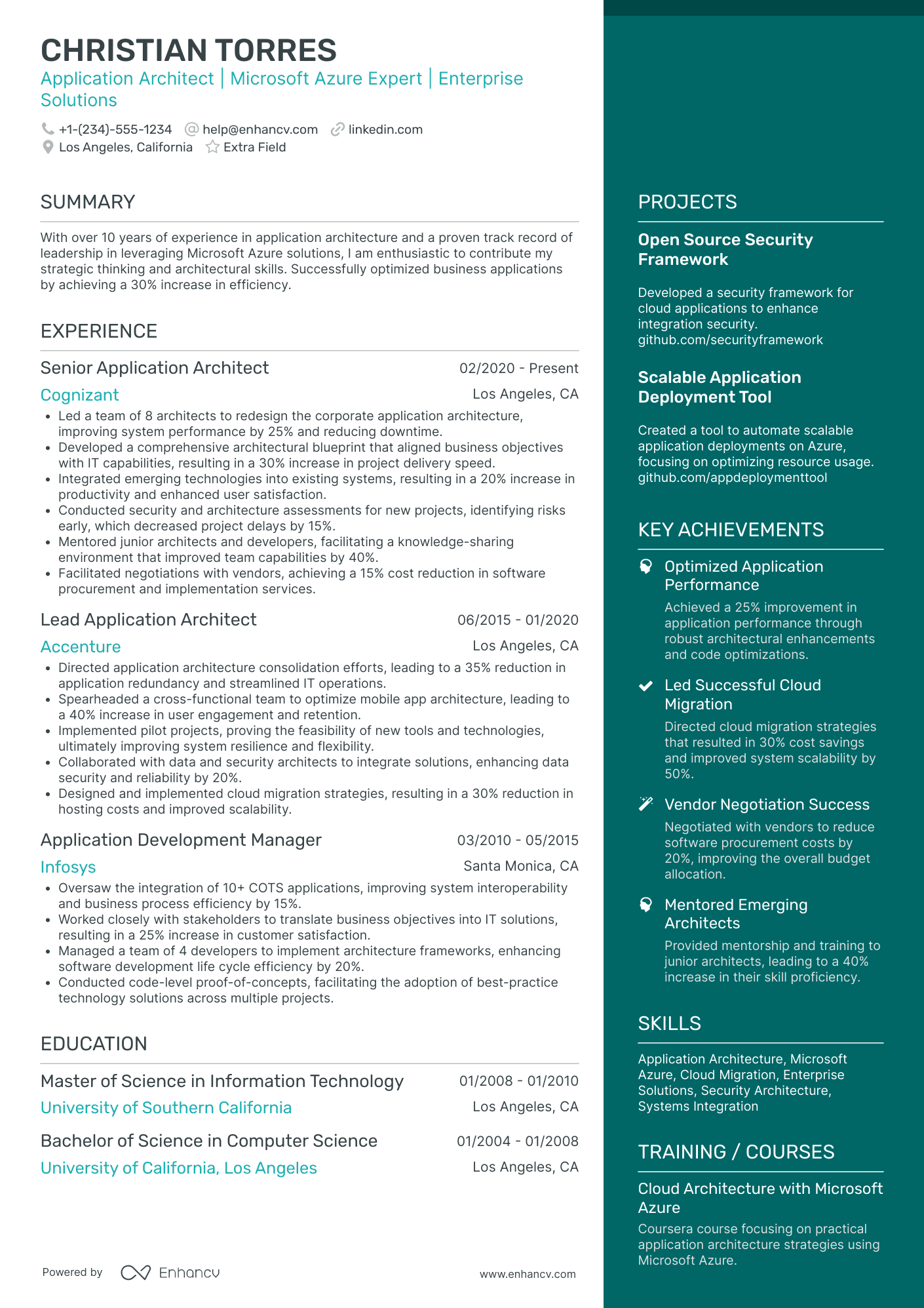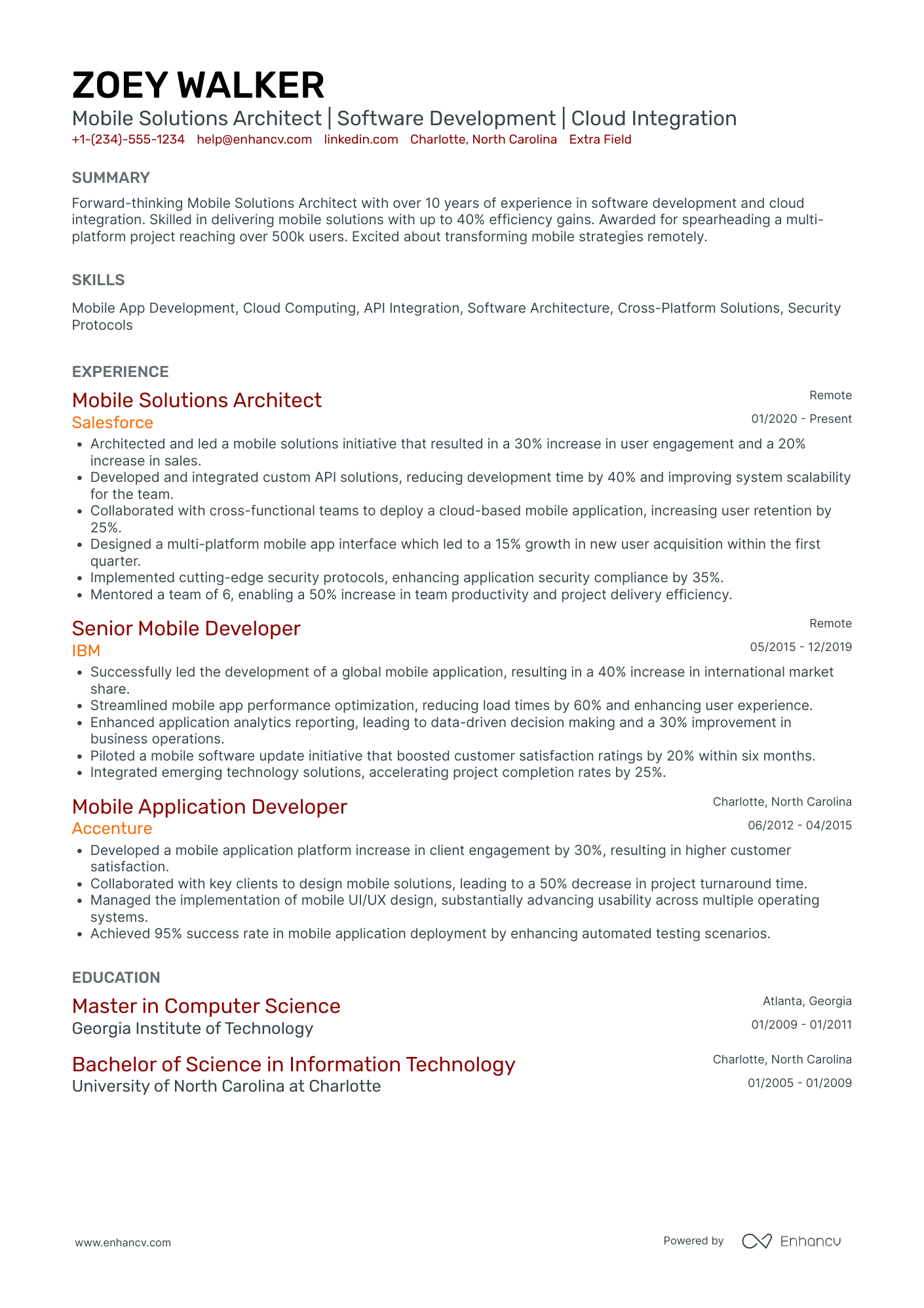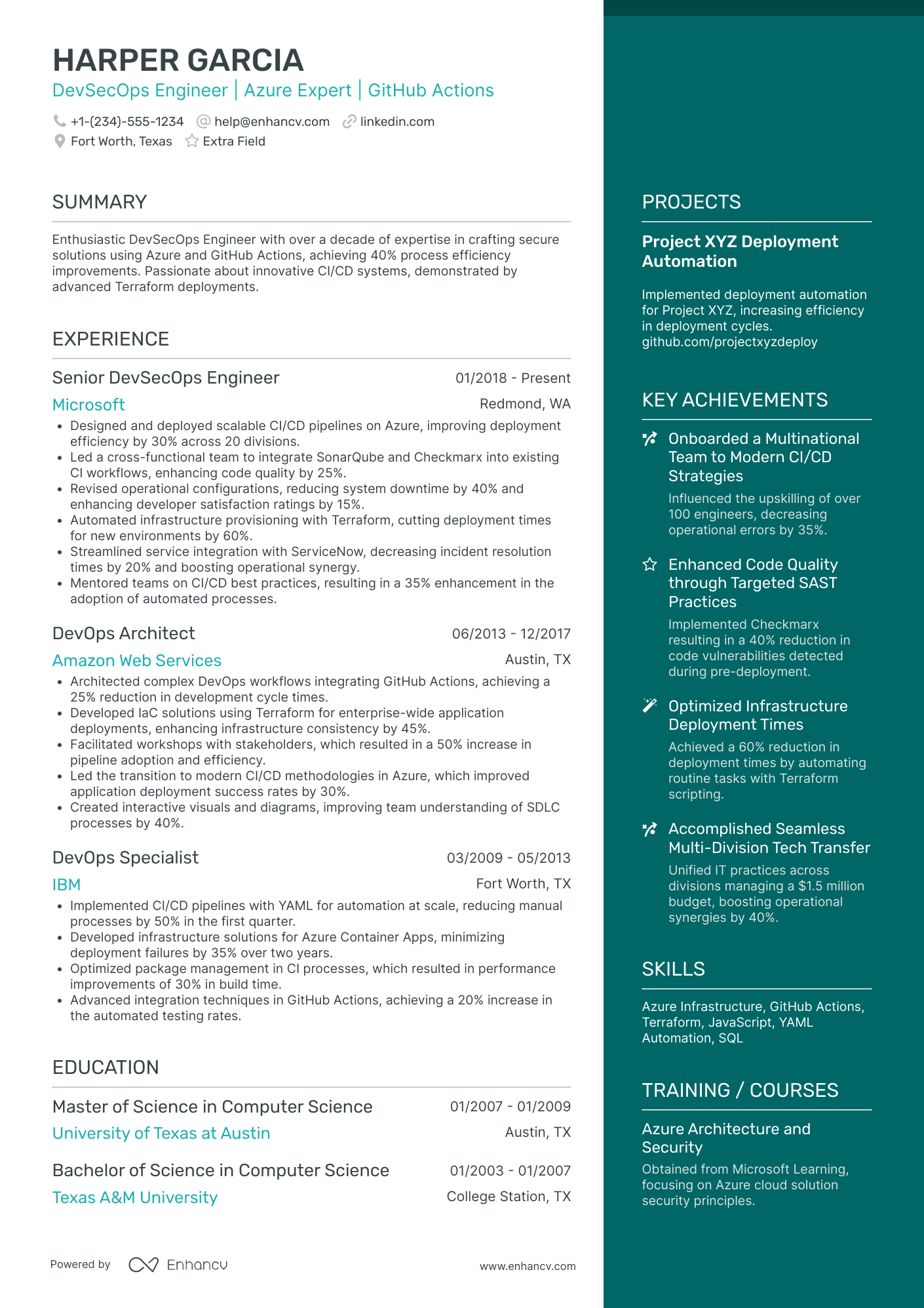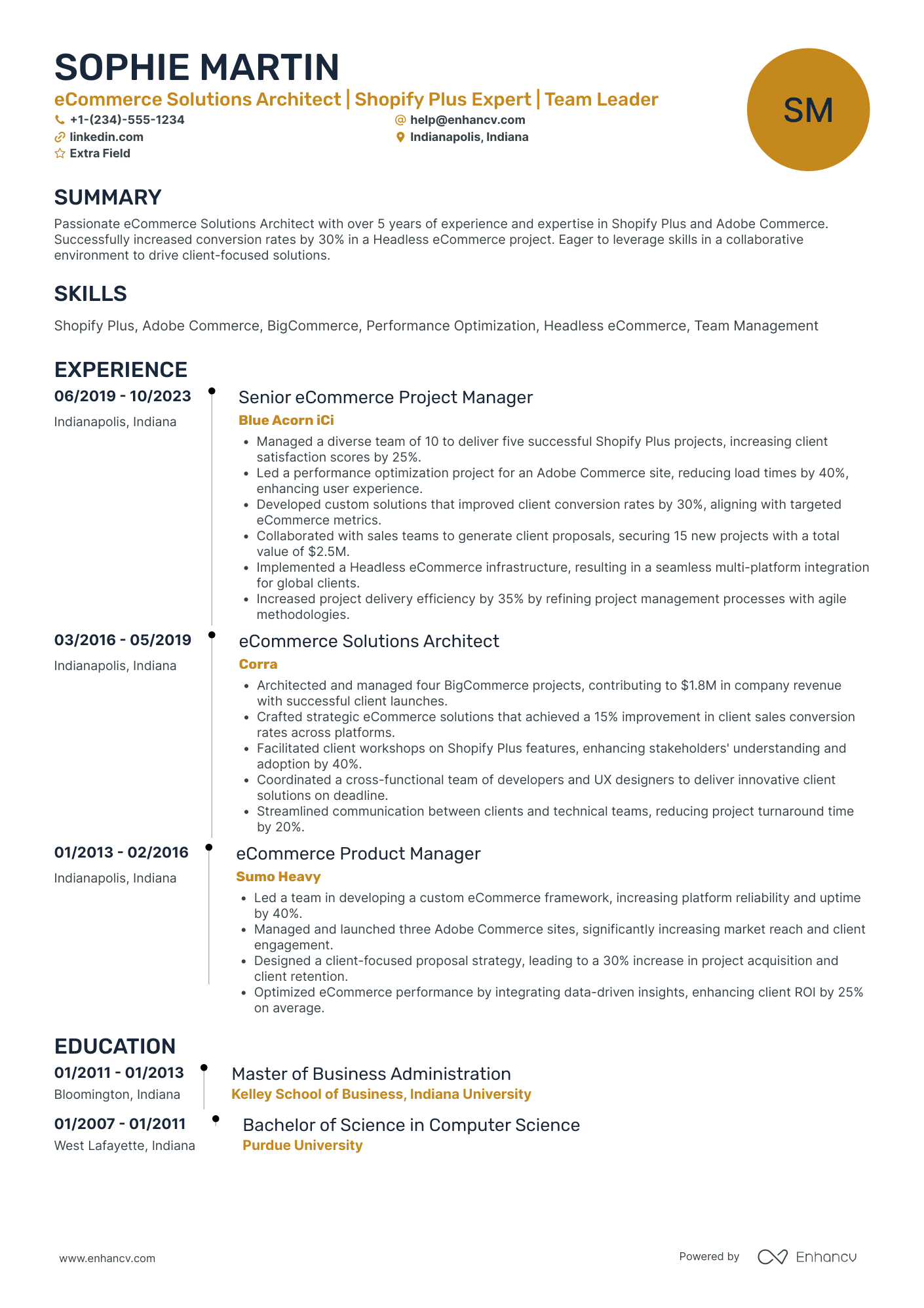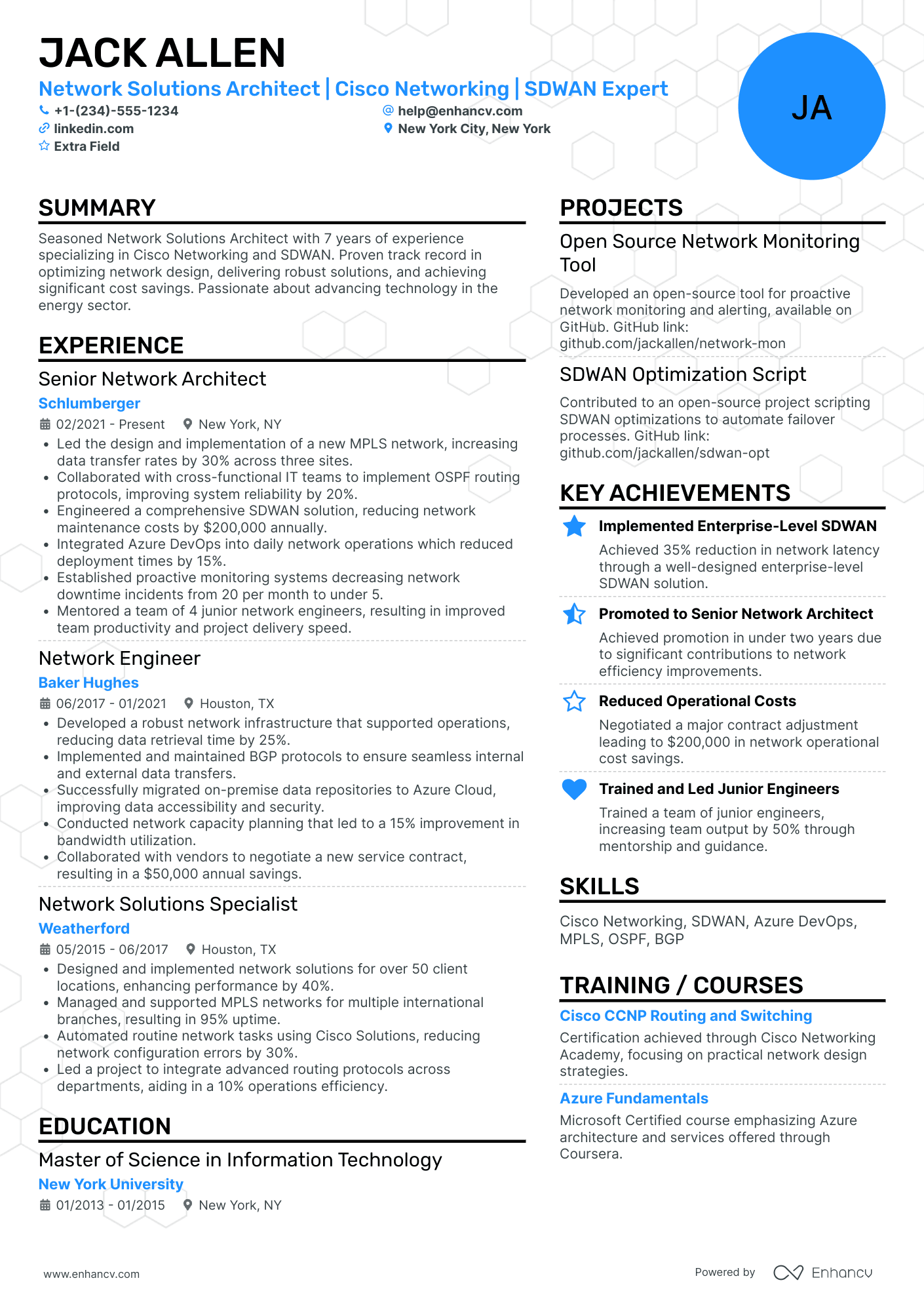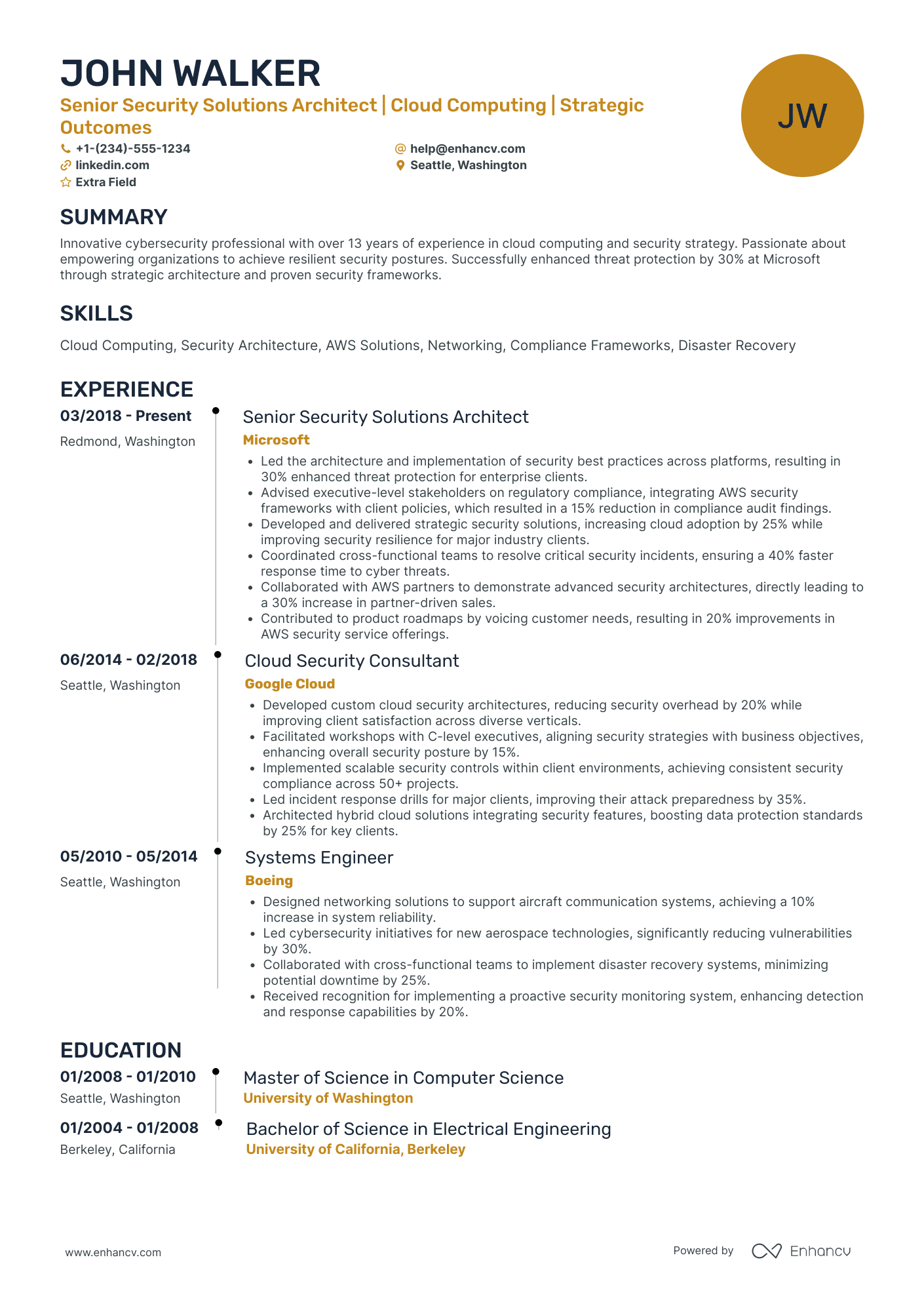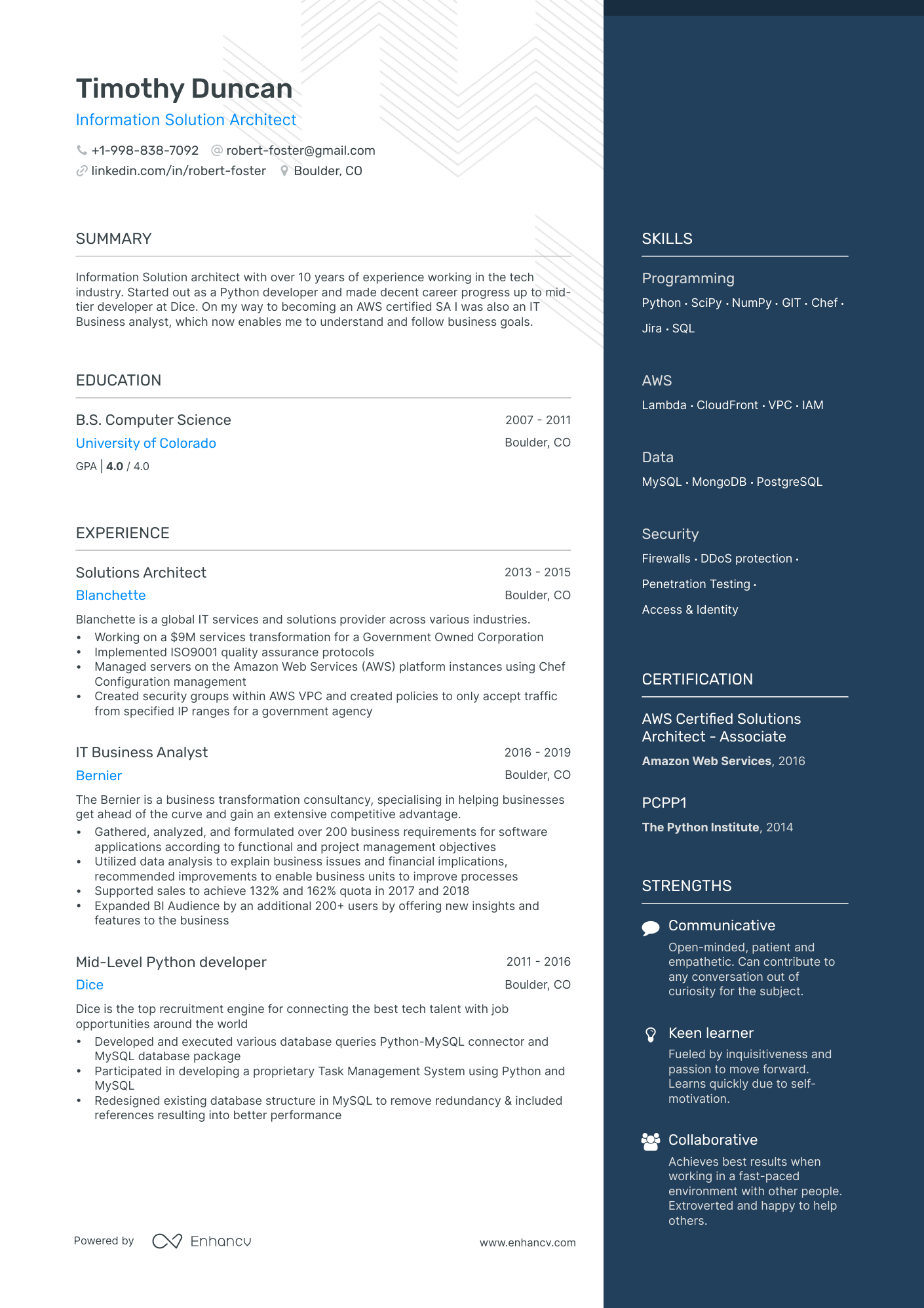As a solutions architect looking for a new job, you face the daunting task of detailing your many years of experience and relatable skill sets into one or two pages of neatly formatted text.
You face hurdles such as non-technical recruiters, descriptive keywords, and hundreds of other applicants applying for the same job.
Scared yet? No need. Our experts use real-world solution architect resume samples to guide you through creating a compelling solutions architect resume that:
- Has the proper format and job-specific skills and keywords to increase your score from applicant tracking systems.
- Shows your familiarity with various architectures and cloud platforms and proficiency in multiple programming languages and tools in a relatable manner.
- Demonstrates your leadership abilities and other soft skills, like problem-solving and critical thinking skills.
- Tailors to the type of industry and specific job duties and responsibilities of the company.
We’ll also link you with job boards that specialize in tech careers where you can post your resume to increase your chances of finding a new job.
If a solutions architect resume does not fit your exact career path, check out these resume examples for other types of computer network architect jobs:
Let’s first take a look at an example of a professional solutions architect's resume before we get into formatting.
Solutions architect resume example
Pretty impressive, right? You’d hire Timothy in a heartbeat if it was up to you.
Notice how the header includes “Information solutions architect” This is an excellent way to increase your chances of recruiters finding your resume through a job title keyword search.
This resume also does a great job of using quantifiable data to detail how their work led to above-average sales and how they are comfortable with handling large-scale enterprises.
The resume also does a good job of:
- Highlighting AWS certification: Timothy's AWS Certified solutions architect - Associate certification is prominently featured. This is particularly valuable for an Information Solution Architect, as it directly relates to in-demand cloud architecture skills and AWS expertise, crucial in this field.
- Emphasizing diverse technical skills: The resume effectively showcases a wide range of technical skills, from programming languages like Python to AWS services and data management tools. This breadth of skills demonstrates versatility and adaptability, key traits for a solutions architect.
- Detailing impactful projects and achievements: Timothy's experience section details specific projects and their outcomes, such as managing servers on AWS for Blanchette and expanding BI audience at Bernier. These concrete examples demonstrate his capability to deliver results and contribute to business objectives.
- Showcasing soft skills in the strengths section: The strengths section, highlighting communicative, keen learner, and collaborative attributes, complements the technical skills. This balance is important for a solutions architect role, which requires not only technical proficiency but also strong interpersonal and team-building skills.
Another key takeaway from this example is its two-column format.
This is the ideal format for job seekers with 10+ years of relatable work experience. It allows you to highlight all of your relatable skills while keeping it to only one or two pages.
Before adding work experience to your resume, we need to talk a little bit about margins, fonts, and other technical stuff.
How to format a solutions architect resume
Everyone knows how important it is to have a properly formatted resume to find a new job. This is especially so today as more companies use applicant tracking systems (ATS) to find experienced employees.
Imagine having to go through 150+ resumes for a single position. Now imagine having to fill ten positions in two weeks. This is why ATS software has become popular recently and why formatting is crucial now more than ever.
If you are building your resume from scratch, set your margins to one inch all around and your line spacing to single space. Your font size should be between 10 and 12 points, with 11 being a good compromise.
Arial and Times New Roman are acceptable fonts but are a bit overused these days. Enhancv resume builder uses several acceptable and good-looking fonts, including Rubik, Lato, Montserrat, Raleway, Exo 2, and Volkhov.
Some critical points to consider when building your resume:
- Header – Include your name, professional title, contact information, and professional social media account. Avoid using any unprofessional or offensive usernames or emails, and use a professional social media account, such as LinkedIn.
- Technical Experience – Your resume’s main job is to detail all relatable networking, computer engineering, and solution architect experience in an easy-to-read format. You also want to include certifications and additional technical training, proficiencies in various programming languages, relatable hard and soft skills, and memberships in professional associations and networking groups.
- Reverse-chronological order – The correct way to list your work experience by date, starting with your current or most recent job. This allows recruiters to see how you have advanced over the years.
- Resume length – Keep your resume to no more than two pages. Preferably, you want to have everything on one page as it is easier to read and cuts down on scrolling or page turning.
When responding to an open position, send your resume as a PDF file (.pdf). This format will preserve the look of your resume, and most operating systems can view it.
Think about the market’s preferences – a Canadian resume, for instance, could have a different layout.
Run your completed resume through the Enhancv resume checker to see how it holds up against real-world solution architect resume examples.
Is your resume good enough?
Drop your resume here or choose a file. PDF & DOCX only. Max 2MB file size.
The top sections on a solutions architect resume:
- Summary: Captures expertise and career trajectory. This section provides a concise overview of the candidate's professional journey and core competencies, crucial for a first impression.
- Technical skills: Details relevant technical proficiencies. Essential for demonstrating the specific technical skills and tools the candidate is proficient in, a key requirement for a solutions architect.
- Professional experience: Showcases relevant work history. This section highlights the candidate's past roles and achievements, demonstrating their experience in solution architecture.
- Education and certifications: Lists academic and professional credentials. Including educational background and relevant certifications, especially important for a solutions architect role.
- Projects: Highlights significant projects and contributions. Focused on outlining key projects the candidate has worked on, showcasing their practical experience and impact in the field.
What recruiters want to see on your resume:
- Proven experience with cloud platforms (e.g., AWS, Azure, GCP)
- Demonstrated ability in designing and implementing scalable, efficient solutions
- Expertise in a range of programming languages and software architecture
- Strong problem-solving skills and ability to manage complex projects
- Excellent communication and stakeholder management abilities
It’s time to jump into the main section of your solutions architect resume and show off all of your relatable skills.
How to write your solutions architect resume experience
An experienced solutions architect will have an average of five to ten years of experience.
The goal of the resume experience section is to detail your past and present solutions architect work experience in as few words as possible. This section is where most people fail to include specific job-related details that make hiring managers want to hire you immediately.
Common mistakes in this section include:
- Listing their skills and experience in a way that is irrelevant to the specific job requirements.
- Not including action verbs and numbers that detail how their experience positively affected the company’s infrastructure and data architecture.
- Forgetting to show their knowledge of business and operations processes in addition to their technical skills.
- Including too much technical jargon when detailing intricate and multi-faceted projects.
Let’s take a look at an example of a real-world solutions architect resume experience:
- •Performed services as a Solutions Architect per client’s business requirements for different systems, applications, and designs,
- •Worked with various teams to develop cloud-based solutions to ensure customer satisfaction,
- •Suported and advised on application assessments and migrations,
- •Created assessments for cloud deployment types,
- •Designed cloud infrastructures to meet customers requirements,
- •Stayed up-to-date with new technologies and business practices,
- •Identified customer enhancements and alerted other departments to address any issues,
This is an example of what can happen when you don’t get into the specifics of the job. It demonstrates some of the basic requirements for the job but does not get into any of the details that recruiters want to see.
Avoid using terms like ‘various teams’ and ‘different systems.’ These should be avoided at all costs as they are too vague.
This example is also missing a brief company description. You want to include this information because the responsibilities of a solutions architect for a financial company will be different from those of a healthcare organization.
When listing your resume experience, you want to include:
- Job title
- Company name
- The type of industry/company description
- Dates of employment
- Bullet list of detailed job duties
Let’s tweak this a little bit and see if we can improve it:
- •Served as a Services Solutions Architect responsible for translating client’s business requirements into enterprise systems, applications, and process designs with interlocking financial modeling for complex technical solutions,
- •Worked with teams of DevOps and SecOps Engineers to architect AWS solutions with the responsibility to ensure the customer maintains an overall cohesive integration with partnering systems and solutions,
- •Provided machine-learning capabilities to monitor spikes and drops in usage that led to a 15% increase in system performance,
- •Created assessments that included public and hybrid cloud development, AWS, Azure, and Google could tiers, OS, COTS, codebase, database, cloud services, application dependencies, and disaster resilience requirements,
- •Designed cloud infrastructure, virtual private cloud, virtual private network (VPN), relational database services, auto-scaling, and computer resources to meet customer’s needs,
- •Maintained an understanding of advanced cloud capabilities and IT and business needs, while identifying and processing cost and functional efficiency options for the customer’s collaborative decisions and actions.
That’s more like it. Any recruiter or hiring manager reading this gets a clear picture of their industry experience, the job duties they performed, and how those duties affected the company.
This example does a good job of:
- The Job Title highlights their years of experience and which platform they have experience with.
- Uses specific keywords like ‘machine-learning capabilities’ and ‘architect AWS solutions’ that ATS software tracks.
- Details their commitment to learning new technologies and business practices.
- Indicates they have experience with large infrastructures and can handle multiple tasks simultaneously.
A small note about creating a targeted resume. When using abbreviations like COTS and VPN, remember that not every recruiter will be familiar with these terms.
When using these terms, include the full name:
- Commercial-off-the-shelf (COTS)
- Virtual private network (VPN)
The above example is from a Senior AWS solutions architect. We’ll cover how to add relatable resume experience for those with no experience later.
How to quantify the impact on your resume
Another common mistake Solution Architects make when adding their resume experience is showing how their coding and programming skills created measurable results.
You want to include numbers and percentages to showcase how you increased data processing times, limited redundancies and drops in usage, and improved overall system performance.
Check out these specific examples that use quantifiable data to show how your work benefited the company:
- Include the size of managed projects – “Collaborated with cross-functional teams ranging from 10-15 people to define and document system requirements, resulting in a 30% increase in project success rate and a 20% reduction in project delivery time.”
- State the number of users impacted by your solutions – “Redesigned AWS cloud-based solutions to better manage a customer base of 150,000+ users.”
- Quantify cost savings or efficiency improvements – “Provided technical guidance and support to other teams, resulting in a 25% increase in team productivity and a 20% reduction in technical issues.”
- Number of cloud migrations completed – “Managed the implementation of 7 data migrations, resulting in a 60% increase in processing times and a 30% reduction in data loss.”
- Amount of data managed or processed – “Supervised the design and development of 12 new data warehouses of 100TB each to support BI initiatives, which led to a $30M annual revenue.”
- Number of stakeholders or clients you have direct interaction with – “Coordinated and ran weekly in-person and virtual meetings with all 20 stakeholders, 10 CEOs, and 6 IT teams ranging from 10-15 employees.”
- List the number of patents or publications, if applicable – “Usable Information Architecture, SitePoint, February 2019.”
When using numbers, write the actual number instead of spelling it out even if your grammar checker is telling you to do so.
How do I write a solutions architect resume with no experience
Even the most experienced solutions architect once faced applying for a job with no real-world experience.
If this is your first time applying for a solutions architect position, you will use your past networking or software development experience to showcase your relatable skills.
Follow these tips on creating a resume with no work experience:
- Header job title – Use a relatable job title like Network Administrator, Software Developer, or Tech Consultant.
- Summary/Objective – Write a brief resume objective that highlights your education, relatable skills, and passion for designing IT systems to solve complex business solutions.
- Education – Place the education section after your resume objective if you recently graduated and only have one or two years of relatable experience.
- Resume experience – Use a reverse chronological order to list all related job experience.
- Search for keywords in the job description that match your transferable skills, and be sure to include them in the job details.
- Certifications – Include certifications that you have and are currently working on.
- Hard and soft skills – List all related hard and soft skills, starting with the skills listed in the job description first.
Past work experience that is ideal for solution architect positions includes network administrators, software developers, system engineers, technical consultants, software developers, and project managers.
Most employers want a minimum of 3-5 years of work experience to qualify for entry-level solution architect positions.
How to list your hard skills and soft skills on your resume
Solution Architects wear many hats and need a mix of hard and soft skills that range from technical to interpersonal.
Hard skills are the technical skills you pick up through school, internships, and work experience. They include necessary skills like Amazon web services (AWS), Azure, or Google Cloud design and implementation, Java programming language, and networking architecture and security protocols.
Soft skills are more personal and based on different life experiences. This is where you can list your excellent communication and interpersonal skills, along with highlighting how flexible and adaptable you are to any situation.
When you include hard and soft skills on your resume, you want to include those skills that are in the job description first. These are the skills that recruiters enter into applicant tracking systems, and you need to match how they are listed.
If the job requirements list “Artificial Intelligence” and your resume has “AI,” ATS software may not mark you as having that skill.
Best hard skills for your solutions architect resume
- Cloud Computing (e.g., AWS, Azure, GCP)
- Enterprise Architecture
- Microservices and Containerization (e.g., Docker, Kubernetes)
- API Design and Management
- DevOps Practices and Tools
- Infrastructure as Code (e.g., Terraform, CloudFormation)
- Network Architecture and Security Protocols
- Data Modeling and Database Management
- Serverless Architectures
- Programming Languages (e.g., Python, Java, Node.js)
- Configuration Management Tools (e.g., Ansible, Chef, Puppet)
- Continuous Integration/Continuous Deployment (CI/CD)
- Performance Tuning and Monitoring
- Artificial Intelligence and Machine Learning Basics
- Big Data Technologies (e.g., Hadoop, Spark)
- Scripting Skills (e.g., Bash, PowerShell)
- Project Management Methodologies (e.g., Agile, Scrum)
- Business Analysis and Requirements Gathering
- Security and Compliance Standards
- IT Service Management (ITSM) Principles
Best soft skills for your solutions architect resume
- Problem-Solving Skills
- Effective Communication
- Strategic Thinking
- Client Relationship Management
- Team Leadership
- Adaptability and Flexibility
- Negotiation Skills
- Creativity and Innovation
- Analytical Thinking
- Time Management
- Empathy and Emotional Intelligence
- Decision-Making
- Active Listening
- Conflict Resolution
- Persuasion and Influencing
- Resilience and Stress Management
- Attention to Detail
- Presentation Skills
- Collaborative Teamwork
- Customer-Oriented Approach
How to list your certifications and education on your resume
Listing your post-secondary and any continuing education indicates two things: You have the basic requirements for the job and you are committed to staying current with new technologies and innovations.
When you list your educational background, you want to include the following information:
- Degree Name
- Name of school
- GPA
- Location
- Dates of attendants/graduation date
If you have multiple degrees, like a Bachelor's and an MBA, list the most recently completed program first.
For certifications, you want to include the name of the certification and the company providing it.
Another place you can highlight a certification is with the resume header.
The person reading this header section would instantly know this person is a certified AWS solutions architect.
Best certifications for solutions architect resumes:
How to write your solutions architect resume summary or objective
The way you write this section will depend a lot on the amount of experience you have.
A resume objective is for those with little to no real-world experience. It focuses on education and relatable skills and is no more than 2 or 3 sentences.
A resume summary highlights past solution architect experience and the desire to find a similar role with a new company. It is longer than the objective and is generally between 3-5 sentences. If you have over 5 years of experience as a solutions architect, you want to go with a resume summary.
Let’s take a look at a resume summary example:
Not bad. It is short and to the point, which is what you want your resume to be.
There is room for improvement by working on the flow and adding some job-specific keywords.
This sample reads much easier and gives specific details about Sean’s past experience. From reading this summary, we see he has experience working on AWS solutions that are customer-focused and committed to maintaining good business practices.
We can now see he has over eight years of experience and where some of his proficiency lies, without having to look at his work experience.
Your resume summary is a great place to add job-specific keywords, so be sure you update this section with relatable skills to score higher with application tracking systems.
Optimize your resume summary and objective for ATS
Drop your resume here or choose a file.
PDF & DOCX only. Max 2MB file size.
Additional sections for a solutions architect resume
A solutions architect will have a number of technical and interpersonal skills to perform all of the requirements of this senior-level position.
Over the course of your career, you have undoubtedly picked up additional skills and experience that can benefit your career path.
Which of those skills and experiences should you list on your resume? Consider adding the following sections to your resume:
Spoken languages
If you are applying for a company that has international clients and customers, list the different languages that you speak and write along with your proficiency
Volunteering Section
If you helped a school or other organization with improving their network or database solutions, you can add this experience under this selection.
Technical skills section
This section is for highlighting additional skills that you did not include in the resume experience. You have a lot of skills under your belt and listing those skills can show how well-rounded your experience is.
The best job boards to increase your resume exposure
In the U.S., there are 180,200 computer network architect jobs added yearly, and that number is expected to increase by 4% each year.
With so many job boards out there advertising they are the best, which ones are right for solution architects? The best way to increase your exposure is by joining job boards that specialize or cater to technical jobs.
PRO TIP
While sites like LinkedIn, Indeed, and Glassdoor will have plenty of IT jobs to choose from, you should also have your resume on the following technical job boards:
Each of these sites allows you to create a profile that employers can search through to see if you are the right fit.
Be sure to fill out as much relatable information as possible to increase your chances of getting your dream solution architect job.
Key takeaways
A well-formatted solutions architect resume will score high with applicant tracking systems and greatly improve your odds of landing a new job.
Throughout this guide, we discussed the importance of following the standard resume format along with:
- The importance of adding job-specific keywords to the header, summary, and resume sections.
- Using quantifiable data in your resume experience to highlight measurable results.
- The correct order for listing past work experience and education.
- Adding additional sections to highlight hard and soft skills
- Tailoring your resume to the company’s industry and specific job requirements using exact keywords and phrases from the job description.
Solutions Architect resume examples
By Experience
Junior Solutions Architect
Lead Solutions Architect
Senior Solutions Architect
By Role
